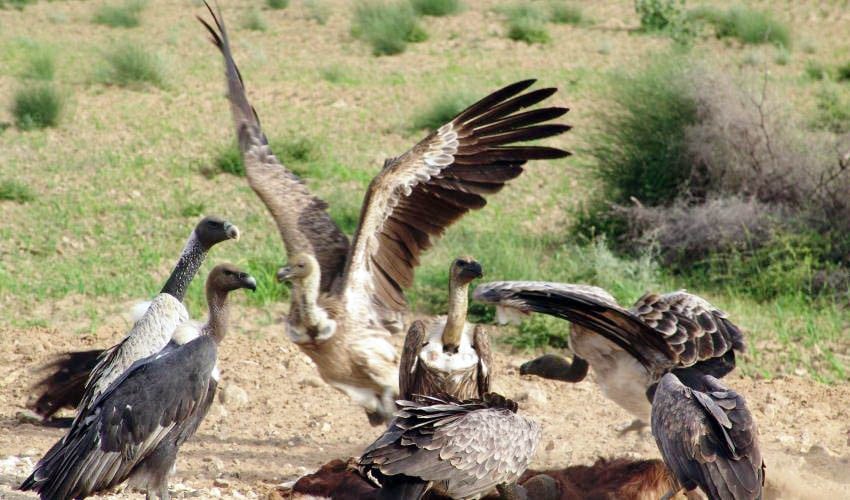
A glimpse of the last remaining population of vultures, secured in a large aviary and locked away from the reach of mankind, is nothing short of a spectacle

The putrid smell from a decaying carcass travels across the area like an epidemic, forming a suspended trail of unpleasant odour within the canopy of Block 4 at Changa Manga forest reserve.
Oblivious to the smell, 70-year-old Rahim leans against a hard earthen wall; his fragile hands clasped together and fingers interlaced as his eyes shift focus through the thick lenses of his black-rimmed glasses towards a disturbance in the distance. Soon the loud cackles and caws of stabbed beaks and thrashed wings gets him excited as he starts moving along the wall to catch a glimpse of the commotion -- a gladiatorial battle.
A resident of a nearby village within the forest reserve, Rahim often stops by this place to watch the last remaining population of vultures secured in a large aviary, locked away from the reach of mankind. Nothing short of a rare spectacle in present-day Pakistan, the feeding frenzy is over soon and the vultures fly back to the perches inside the aviary, spreading out their wings as if wanting to fly.
Not so long ago, these birds soared high on thermals in the skies of Lahore and its surroundings. Those were the days when the fruit bearing trees of the city, once dubbed as "The city of gardens," provided refuge to many species of birds. That was also the time when the residents of Lahore valued the many aspects of these neighbourhood birds and their key place in the ecosystem.
Even then while birds were generally well liked, the vultures attracted attention for their perceived negative qualities of greed and rapaciousness.
The sinister image was further ingrained in Lahore’s cultural memory when Bano Qudsia’s novel ‘Raja Gidh’ hit the bookstands in the early 1980s. Whereas the novel was believed to be an attempt to negotiate a current explanation of the then military rule of General Zia-ul-Haq, the negative cultural account it drew of the vulture, however metaphorically, as an omen of bad things and forebodings, held sway in popular imagination for a long time to come. By symbolising it as a sign of grim death, a winged ghoul waiting patiently in the wings to prey on victims led astray, the die was cast for the future of the bird.
Soon the copacetic arrangement shaped over ages between the city and the vultures faded and the very bird that once provided the most important ecological service of ridding the streets and alleys from its carrion was now considered a reproach to the city. The spirit of Lahore was blunted for one of its oldest resident, treated as an outcast -- considered vile.
But little did the city dwellers know that by pushing aside the vulture from the cultural fabric they were also erasing one of the most important roles of the bird within the city -- a connecting point between the city-dwellers and the broader environment together.
Back in Block 4 of Changa Manga forest reserve, the rancid smell followed Rahim as he hobbled back to his village on a dusty track. All the while his restless mind refused to accept the fact that the natural character of the vulture was twisted in the past to fit people’s images of the world. It was hard for him to believe that a few granules of an anti-inflammatory drug could have wiped out an entire population of a bird whose gastric juices were acidic enough to neutralise rabies, cholera and anthrax.
To him it was the lack of empathy shown by the city dwellers when the "Raja Gidhs" of Lahore tumbled down from the high branches one after the other. They vanished from the city skies when these raw-necked ungainly sloths were condemned for filth and voraciousness. An entire die-off of the species went unnoticed as people stopped caring.
The old man stopped and from a distance looked back at the vulture rehabilitation centre where the once undisputed kings of Lahore’s skies were now confined to an aviary. Rahim let out a long sigh of despair, perhaps longing for the day when people start caring again; only then the native "Raja Gidhs" shall return.